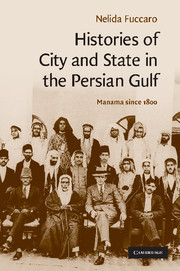Book contents
- Frontmatter
- Contents
- List of illustrations
- List of maps
- Acknowledgements
- Note on transliteration and terminology
- Glossary
- List of abbreviations
- Map 1 The Persian Gulf and Bahrain in the regional context
- Map 2 Bahrain's settlements
- CAMBRIDGE MIDDLE EAST STUDIES 30
- Introduction
- 1 Indigenous state traditions and the dialectics of urbanisation in Bahrain, 1602–1923
- 2 The making of Gulf port towns before oil
- 3 Ordering space, politics and community in Manama, 1880s–1919
- 4 Restructuring city and state: the municipality and local government
- 5 ‘Disorder’, political sociability and the evolution of the urban public sphere
- 6 City and countryside in modern Bahrain
- Conclusion
- Bibliography
- Index of persons, tribes and families
- Index of subjects
- Index of places
5 - ‘Disorder’, political sociability and the evolution of the urban public sphere
Published online by Cambridge University Press: 20 January 2010
- Frontmatter
- Contents
- List of illustrations
- List of maps
- Acknowledgements
- Note on transliteration and terminology
- Glossary
- List of abbreviations
- Map 1 The Persian Gulf and Bahrain in the regional context
- Map 2 Bahrain's settlements
- CAMBRIDGE MIDDLE EAST STUDIES 30
- Introduction
- 1 Indigenous state traditions and the dialectics of urbanisation in Bahrain, 1602–1923
- 2 The making of Gulf port towns before oil
- 3 Ordering space, politics and community in Manama, 1880s–1919
- 4 Restructuring city and state: the municipality and local government
- 5 ‘Disorder’, political sociability and the evolution of the urban public sphere
- 6 City and countryside in modern Bahrain
- Conclusion
- Bibliography
- Index of persons, tribes and families
- Index of subjects
- Index of places
Summary
The previous two chapters have explained the evolution of politics and society in Manama before and after the discovery of oil, focussing on the role of networks of patronage, of imperial and overseas connections and, after 1919, of municipal government. This chapter traces the evolution of urban political sociability in the same period through the lens of civic strife, popular politics and ideological contestation. These were the ‘unruly’ activities which reshuffled power between urban groups, and between them and the state. Key episodes of unrest and the performance of Muharram rituals are analysed as contexts of public engagement and as evidence of the changing relationship between the body politic of Manama and the government of Bahrain. Not only did they bring new leaders, social groups and political allegiances into the arena of urban politics but also fostered the growth of new forms of community and public consciousness. Muharram rituals, in particular, marked the evolution of Shi‘i popular politics throughout the period. The lower classes of Manama used them as venues to express values and symbols which addressed issues of power, authority and class in the public arena.
Episodes of unrest in Manama also marked crucial junctures in the process of nation and state building, a further testimony to the importance of urban activism in reshaping Bahrain's political and social orders.
- Type
- Chapter
- Information
- Histories of City and State in the Persian GulfManama since 1800, pp. 151 - 190Publisher: Cambridge University PressPrint publication year: 2009
- 1
- Cited by



